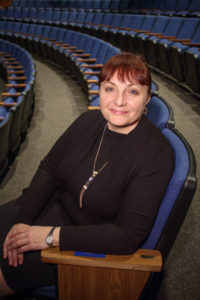
Diane Paige, professor of music, explores how young adults can get in on the fun as well.
Diane M. Paige received her B.M. in Music Education from Colorado State University where she minored in Slavic Studies. Her master’s degree in Musicology was awarded by Iowa State University where she wrote a master’s thesis entitled Dvorak in Spillville. She received her Ph.D. in Musicology from the University of California, Santa Barbara. Her dissertation, entitled The Women of Leoš Janáček’s Operas, explored the archetypes and female roles of the Czech composer’s mature operas. She has published in The Musical Quarterly, with Princeton and Cambridge (forthcoming) Presses, and is currently at work on a book about music and war from the American Revolution to present. She has presented her research at a wide variety of venues including BBC Radio 3, Lincoln Center for the Arts, and the Bard Music Festival.
At Hartwick she teaches the three-semester music history sequence, an introductory world music course, and courses on specialized topics such as Music of the African Diaspora, Music and World Wars I and II, and Music of the Roma (Gypsies). She has led off-campus courses to Anguilla, B.W.I. (student practica), Brazil (carnival and its music), and Ghana (dance, drumming, and oral history).
On the Power of Play
What role does play have in a college classroom? Play is an astonishingly powerful means to develop the intellectual and social skills characteristic of a liberally educated person. It teaches us to honor the process as much as the product; that is, earnest play is rarely just about the win. When engaged in play as children, we did not expect to win each time, but rather hoped to refine our skills as strategists so that we could win at some point. Our childhood games were exciting because of the possibilities they brought. Imagine what were to happen if our classrooms were to become such spaces.
History professor Mark Carnes provides evidence of the effectiveness of gaming in the classroom in his seminal work “Minds on Fire: How Role-Immersion Games Transform College.” Among his findings: students learn more when teachers say less.
One effective way to study the music of the world wars is by building cardboard monuments of notable musicians, playing a cooperative card game about trench warfare, and engaging in role-playing intent on preventing the outbreak of war on a fictitious continent. Through these and other experiences, students grappled with complex issues of censorship, cultural heritage in the time of war, the act of remembering, and the notion of music as an agent of good and of evil. They learn to work together, to become more empathetic to the world around them, and to experience how delightful the life of the mind can be.
When students reflect on their experiences, themes of deep connection to and engagement with the material emerged. Oh, yes. And that it was fun. Ten years ago I might have bristled at the thought that students would above all else consider my courses “fun” (Did they think it was easy? Not serious enough?). I now understand that that word can signify a deeply satisfying level of engagement.

Comments
2 responses to “Diane Paige, Hartwick College – On the Power of Play”